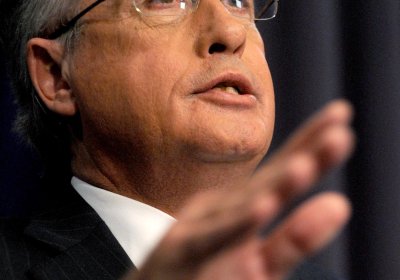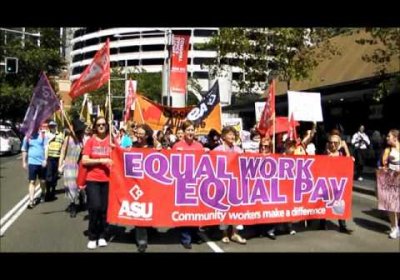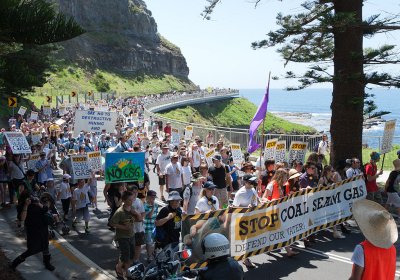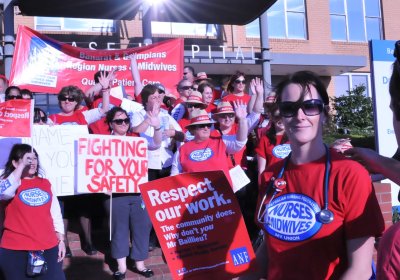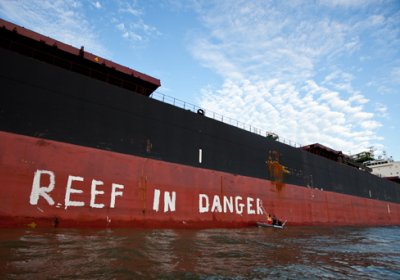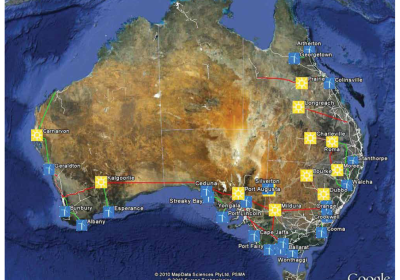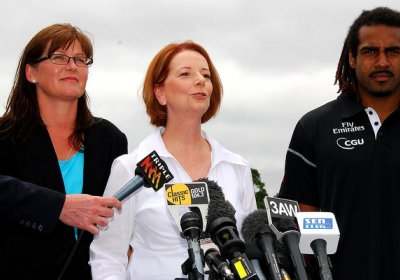Photos by Peter Boyle
More than 500 women and their supporters marched through Sydney's CBD on March 10 for an International Women's Day protest.
Australia
A “free trade agreement” being negotiated by Australia, the United States and other countries could have profound impacts on crucial public policy issues including food security, natural resource management, access to essential medicines, public assets and more.
Negotiations for the Trans-Pacific Partnership Agreement (TPPA) – including Australia, the US, New Zealand, Chile, Peru, Singapore, Brunei, Malaysia and Vietnam – are taking place in unprecedented secrecy.
Media watchers should be forgiven for a degree of confusion over statements by federal treasurer and deputy prime minister Wayne Swan in the past two weeks.
He began the month with a Press Club address, published in The Monthly’s March edition titled “The 0.01%” where he attacked “the rising power of vested interests” — naming mining magnates Clive Palmer, Andrew Forrest and Gina Rinehart — for “undermining our equality and threatening our democracy”.
The 2012 International Women's Day (IWD) march in Sydney, Australia, took place on March 10. Protesters marched from Town Hall to First Fleet Park near Circular Quay, where they held a IWD picnic.
A public forum “Beyond the Carbon Price” will take place at NSW Parliament House on April 27 to open the fourth Climate Action Summit, to be held at the University of Western Sydney over April 27-29.
A diverse panel of speakers will engage with the question of how Australia should tackle climate change now that the carbon price has been adopted.
Despite the NSW government's promise to rule out sensitive areas to coal seam gas (CSG) activity, the long-awaited Strategic Regional Land Use Plan and Aquifer Interference Policy means “every part of NSW is still up for grabs”, Jess Moore from Stop CSG Illawarra said on March 6. Liberal premier Barry O’Farrell’s government policy is “a disaster and a broken election promise”. Moore said “no areas are off limits to CSG”.
After eight months of campaigning by Victoria’s nurses to keep staff-to-patient ratios and win a wage rise there may be a breakthrough in the dispute.
On March 7, the Ted Baillieu Coalition state government finally offered to begin new negotiations with the Australian Nursing Federation (ANF) though a conciliation process overseen by Fair Work Australia.
Workers and their unions need strong labour law reforms. Two of many changes I urge can be adopted by the Independent Inquiry into Insecure Work in Australia and the federal government’s Fair Work Act Review are:
1. Amend the Fair Work Act to repeal the penal powers and have an effective right to strike.
2. Amend the Fair Work Act to restrict casual and other forms of precarious work to a limited period. Then require employment contracts for ongoing, more permanent work. Fair Work Australia should have the power to order the transition to more secure employment contracts.
The Ballerrt Mooroop College Support Group met on March 4 to discuss action in response to the imminent closure of the college, which is the last surviving Aboriginal school in Melbourne.
Aboriginal people in the area have worked hard to keep the school open. But over the past 12 months, the education department has taken much of the land away and bulldozed the valuable student and community asset, the gymnasium/gathering place.
Greenpeace activists on March 7 painted a huge message saying “Reef in danger” on the side of the Panamanian-registered coal ship Chou Shan, which was moored in Gladstone Harbour.
The action was timed to coincide with the arrival of a delegation from UNESCO investigating the impact of large-scale gas and coal developments on the Great Barrier Reef's world heritage values.
It was a week which started with federal treasurer Wayne Swan having a go at the mining billionaires for distorting our democracy, but which soon entered a new phase whereby the Labor party illustrated the rather narrow range within which our two party system has room to move.
In 1963, a senior Australian government official, A R Taysom, deliberated on the wisdom of deploying women as trade representatives. “Such an appointee would not stay young and attractive for ever [because a] spinster lady can, and very often does, turn into something of a battleaxe with the passing years [whereas] a man usually mellows.”
On International Women’s Day 2012, such primitive views are worth recalling; but what has happened to modern feminism? Why is it so bereft of its political, indeed socialist roots, that any woman who “achieves” within an immoral system is to be admired?
- Previous page
- Page 761
- Next page

